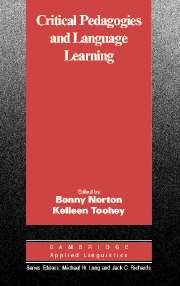Book contents
- Frontmatter
- Contents
- List of contributors
- Acknowledgments
- Chapter 1 Critical pedagogies and language learning: An introduction
- I RECONCEPTUALIZING SECOND LANGUAGE EDUCATION
- Chapter 2 Two takes on the critical
- Chapter 3 Critical multiculturalism and second language education
- Chapter 4 Gender and sexuality in foreign and second language education: Critical and feminist approaches
- Chapter 5 Assessment in multicultural societies: Applying democratic principles and practices to language testing
- II CHALLENGING IDENTITIES
- III RESEARCHING CRITICAL PRACTICES
- IV EDUCATING TEACHERS FOR CHANGE
- Author Index
- Subject Index
Chapter 5 - Assessment in multicultural societies: Applying democratic principles and practices to language testing
Published online by Cambridge University Press: 05 October 2012
- Frontmatter
- Contents
- List of contributors
- Acknowledgments
- Chapter 1 Critical pedagogies and language learning: An introduction
- I RECONCEPTUALIZING SECOND LANGUAGE EDUCATION
- Chapter 2 Two takes on the critical
- Chapter 3 Critical multiculturalism and second language education
- Chapter 4 Gender and sexuality in foreign and second language education: Critical and feminist approaches
- Chapter 5 Assessment in multicultural societies: Applying democratic principles and practices to language testing
- II CHALLENGING IDENTITIES
- III RESEARCHING CRITICAL PRACTICES
- IV EDUCATING TEACHERS FOR CHANGE
- Author Index
- Subject Index
Summary
Introduction: The power of tests
This chapter will discuss dimensions of the power of language tests and their special roles in multicultural societies in which different groups are rejecting assimilative notions for the sake of recognition and interactive models. By discussing a number of language testing scenarios, the chapter will show how tests serve as tools to perpetuate de facto assimilative models. It will then propose a number of principles and assessment practices that better match democratic societies by giving voice to different groups, applying interactive assessment models, monitoring the uses of tests, protecting the rights of test takers, and recommending that language testers assume greater responsibilities for the tools they develop.
This chapter is contextualized within the framework of critical language testing (CLT) (Shohamy, 1998, 2001a, 2001b), an area that applies theories of critical pedagogy and critical applied linguistics (Kramsch, 1993; Pennycook, 2001) to the domain of language testing. CLT emerges from the need to examine, question, and monitor the uses of assessment tools in education and society, especially as they are used by institutions of power and authority. The need to examine, question, and monitor the uses of language tests is a result of growing evidence that tests are used in powerful ways in a variety of contexts. In this regard, Tollefson (1995) claims that tests represent three sources of power: state, discourse, and ideology. State power is understood in terms of bureaucracies, discourse power in terms of the imposition of tests by unequal individuals (the tester and the test taker), and ideological power in terms of the belief of what is right and what is wrong, what is good knowledge and what is not, what is worthwhile economically and what is not.
- Type
- Chapter
- Information
- Critical Pedagogies and Language Learning , pp. 72 - 92Publisher: Cambridge University PressPrint publication year: 2004
- 32
- Cited by



